Excerpts of a sermon preached a Springfield Christian Church, Springfield, VA on Micah 5:2-5, Luke 1: 46-55
There’s a reason that songs like “New York, New York” and “Hollywood” are so popular. We love singing about the cities where “If you can make it there, you can make it anywhere” because there’s a popular assumption in America that if anything really good happens, it will come out of a big city.
Because of these facts, it’s so easy to believe that important things happen in important towns. Period. If you don’t live in an important town, oh well. . . not much is going to go on.
But is this always the case?
When I say, Seneca Falls, NY, you know it. Why? The women’s movement.
Seneca Falls, a once sleepy town of a few families rose to prominence when Elizabeth Candy Stanton decided to organize a gathering that became THE start of a woman's right to vote.
When I say Selma, you know it. Why? The Civil Rights Movement.
We know of Selma, a sleepy town of a few thousand residents in the middle of Alabama, because of that fateful day on March 7, 1965 Martin Luther King, Jr. and thousands of supporters dared to say segregation would no longer be tolerated.
When I say Plains, GA, you know it. Why? Because of Jimmy Carter.
Plains, a central GA town of still only 688 residents today was the birthplace and still is the homestead of Jimmy Carter, the 39th President of the United States. Who would have thought that a peanut farmer would one day be at the center of American history both in and out of office?
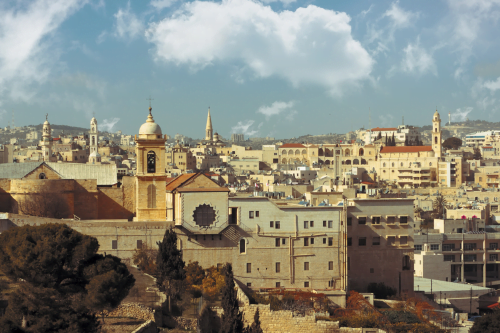 And such seems to be the message of Micah chapter 5. The prophet Micah opens the chapter he says this hopeful word about the nation of Judah’s restoration: “But you, O Bethlehem . . . who are the one of the little clans of Judah, from you shall come forth from me one who is to rule Israel.”
And such seems to be the message of Micah chapter 5. The prophet Micah opens the chapter he says this hopeful word about the nation of Judah’s restoration: “But you, O Bethlehem . . . who are the one of the little clans of Judah, from you shall come forth from me one who is to rule Israel.”
Micah is writing around 760 BC a time the nation of Judah is living under siege from the the Assyrians. They’d invaded the region and their military prowess was bar none—so weren’t going away anytime soon. You can imagine that folks feared for their safety and their security in the future.
And this was the word of the LORD: a new ruler is going to come out of Bethlehem.
I can image the disbelief of those who heard this prophetic message. “You’ve got to be kidding me! Why not Jerusalem or at least some other town . . . Not tiny Bethlehem! Times are hard. We’ve got to do better than that!”
Even though Bethlehem was the the hometown of David, and historically they’d already been through this before--- when Samuel was told by the LORD to go there to anoint the next king of Israel from among the sons of Jesse—the fact in Micah’s time was UNBELIEVABLE as well.
So hope from “one of the little clans of Judah?” Not exactly a New York or LA kind of dream . . .
In Luke's gospel two cousins, Mary and Elizabeth meet up. Filled with wonder of their unexpected and unlikely pregnancies, 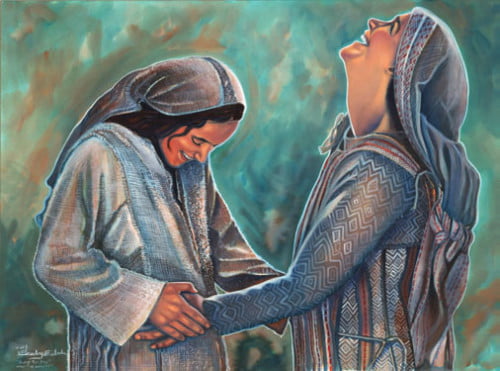 they both knew one thing: God was with them. And in Mary’s case quite literally.
they both knew one thing: God was with them. And in Mary’s case quite literally.
For as soon as Elizabeth saw her with child cousin, we are told the Christ child leap in her womb. And in response, not only did Elizabeth exclaim about Mary, “Blessed is the fruit of your womb” but Mary is so overcome with thanksgiving she begins to sing. Saying, “My soul magnifies the Lord.”
And the song, known in our Christian tradition as the Magnificat, is the original radical Advent carol.
Hear these words of Mary: “My spirit rejoices in God my Savior, for he has looked with favor on the lowliness of his servant. . . . [God] has shown strength with [God’s] arm; he has scattered the proud in the thoughts of their hearts. He has brought down the powerful from their thrones and lifted up the lowly.”
I’m not sure Mary would be impressed with our modern-day celebrity figures, presidential candidates or even Barbara Walter’s list of “The 10 Most Fascinating People of 2015” Nope. She speaks of how God has “filled the hungry with good things.”
Famed Episcopal preacher, Barbara Brown Taylor says this about Mary in her book, Home by Another Way: Mary sings, “for every son and daughter who thought God has forgotten the promise to be with them forever, to love them forever, to give them fresh and endless life.”
Mary’s song is the theme of the hopeless!
And it’s like the songs lifted up throughout the pages of scripture by other “lowly ones” come before her.
Such as ones by Miriam, Moses’ sister who sings of the “horse and the rider being thrown into the sea” as the LORD delivers the children of Israel from Egypt.
Ones like from Hannah, barren and without any status from her family or cultural system, sings when she learns she’s pregnant of how “the bows of the mighty are broken but the feeble grid on strength.”
Ones from the unknown Psalmist of number 146 which speak this: “The LORD watches over the strangers, upholds the orphan and the widow.” (7-9).
These songs are resistant songs, much like Mary’s carol. Songs which beat with the sound of God’s heart for those who we’d never expect to get to know! The world may forget, but God does not!
Are you seeing the picture?
 This weekend, my husband and I were a part of a mission in Honduras. As we celebrated Christmas with a group of boys at orphanage each boy received a Christmas present. It’s not an unusual tradition for it now happens every year, but for a couple of the two youngest boys new to the center, it was completely new.
This weekend, my husband and I were a part of a mission in Honduras. As we celebrated Christmas with a group of boys at orphanage each boy received a Christmas present. It’s not an unusual tradition for it now happens every year, but for a couple of the two youngest boys new to the center, it was completely new.
One of them, I'll call him Luis, recently came to the center because his other brothers all died in gang shoot out. His mother was afraid for his life and took him to the country’s social services to ask for him to be placed in a home where he wouldn’t be killed by the men in the gangs too. She could not bear to lose one more son. His adjustment to life without his mom and his brothers hasn’t been easy but slowly Luis is finding his place in his new safe home.
During the Christmas celebration Luis’s name was called to come forward and receive his present. And in his package he found a remote control toy car. After returning to his seat, we later learned that Luis bowed his head, closed his eyes and prayed:
The look of joy, his teacher said, on his face beamed with pride! A dream come true for this 9 year old happened!
This to me, was a picture of what lifting up the lowly is all about. A child in a Honduran orphanage who thanked God for his first Christmas present!
For when I see God come in my life, I most assuredly see God in the faces of kids like Luis.
This is what I most want to offer you today when God comes—God not only keeps God’s promises and sends messengers and gathers us together but God lifts up the lowly.
The only question is will we see our Lord this Christmas? Will we make room for this great surprise?
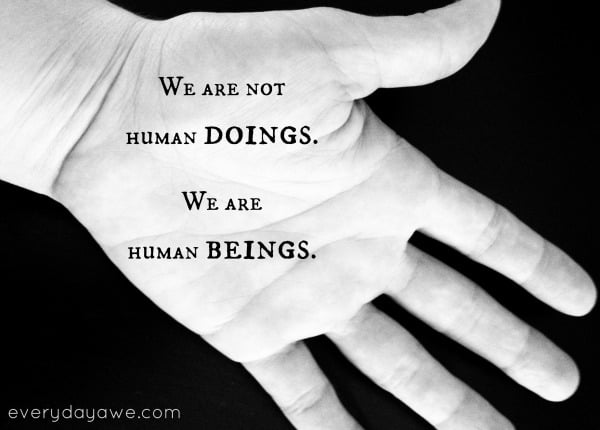
A whole new way of looking at "my labor" came many years ago when a friend introduced me to a quote from Barbara Brown Taylor's book, Leaving Church.
I copied it right away from the email she sent and put it on the bulletin board above my desk at the office.
I looked at it often trying to figure it out in my own context of professional ministry. What did responding to the call "to be fully human" mean?
I loved the idea of more balance, more harmony in how I moved from task to task (not just the ones I was "paid" for).
Sure, I had a job description and goals, but could being a human being be my life goal? Because I liked being a human being who was also a minister, not just all those piled on expectations.
So, just for kicks I tried an experiment of living by these words. This is what I noticed:
Bottom line: more of us ministers need to let our humanness show.
And I don't think this lesson is exclusive to pastors. Maybe it is a call to all people of faith.
But instead these are the messages that the church is known to project:
"Oh no, don't join Rotary Club. That will take time away from the Property Committee at the church."
"Oh no, don't serve as a PTA mom at your child's school. That will mean you can't come to the women's Bible Study on Tuesday mornings."
"Oh no, don't give your money to Habitat for Humanity. That will mean less money you can give to the church."
Yes, Christian community is important. Yes, being a part of worship on a regular basis helps us give God, God's proper place in our lives. Yes, the sacraments are important and the work that can only be done in the church.
But, there's a great big ole world out there. And if we're trying to be human, we've got lots of ground to explore, people to visit, and moments of rest to take (because God took days off too).
Serving God is not a check box that will fulfill solely within the confines of any church activity. It's a way of life.
It's how we treat people.
It's how we show up for people.
It's how we use our time and resources to move forth good things in the world both for others and ourselves.
It's how we say we're sorry (because we all make mistakes).
And it's how we give ourselves a break.
We're only just human after all.
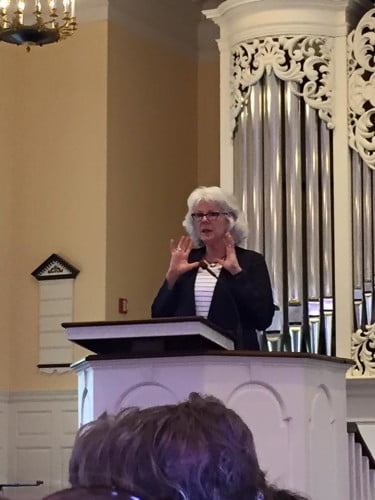 This week, I attended the inaugural writing workshop of the Frederick Buechner Center at Princeton University. I was excited to re-connect with pastoral colleagues and hear one of my preaching sheros, Barbara Brown Taylor talk about writing.
This week, I attended the inaugural writing workshop of the Frederick Buechner Center at Princeton University. I was excited to re-connect with pastoral colleagues and hear one of my preaching sheros, Barbara Brown Taylor talk about writing.
During the Q&A time of Taylor’s last morning lecture on telling the truth in writing (great topic, right?), she responded to a question from the audience.
She talked about how nervous this speaking engagement made her: “Really the first Buechner lectures? No pressure, really? . . . Well, I did it. And, now and I’m so glad it’s over.”
You should have seen the huge grins that filled the faces in the pews.
We knew she didn’t have to say this. She was Barbara Brown Taylor after all! We hung on her eloquent sentences and well-coordinated hand gestures.
But, BBT felt anxiety about speaking at Princeton?
But, you and I live in a world of gaps where super human labels are the norm.
Teacher, student.
Mentor, mentee.
Parent, child.
We get stuck in these places, these roles.
We allow ravines to divide us and fill the gap with expectations, convention and keeping everything nicely polished on LinkedIn.
We fill the gap with tears wiped away too soon while proclaiming, “I wouldn’t want to scare her.”
We fill the gap with reliance on being “all-knowing” so that our grown-up card isn’t suddenly yanked.
And we let our shiniest parts be known.
Our degrees.
Our clean houses.
Our biggest accomplishments at work.
We put away our insecurities, our fears and our deepest complexities in the attic, next to that Christmas decoration box we only get down once a year.

(And leaping the into the vulnerability ravine).
On Wednesday at lunch, I sat with a pastoral colleague, woman who was becoming a new friend. Our stories of child loss rose to the surface. We both knew a God who did not heal, who made us angry, and whose “perfect plans” felt unfair at the deepest levels.
We both cried for the gut-wrenching loss that feels so invisible to most and what it means to live in a world that doesn’t acknowledge our way of mothering.
Later, my friend said, “Thank you for sharing your pain with me. You don’t know how good it was to know someone who has felt all of those things too.”
I took a deep breath in thanksgiving of how the gap closed so quickly from a stranger to a friend. Our willingness to risk talking about our “ugly” brought us this gift.
Not everyone has ears to hear the ugly. Not every audience is open enough to receive our fears.
But what gaps can be closed among us when we don’t try to be so perfect!
When we think what will make our Christmas really amazing this year, I’m sure all of us have some ideas . . .
Or, in my case no flight delays on Christmas morning . . .
It’s true: we come to this time of year with lots of expectations.
We want Christmas Eve to be magical full of light and love.
We want Christmas morning to be charged with feelings of peace on earth and no more cyber terrorism.
And if we are a parent, we want the days between Christmas and New Years’ to go by really fast so school starts soon . . .
But have we ever thought about Christmas as the day when nothing went as planned and God’s greatest blessings were completely unexpected?
This is the familiar story that we know: Mary has just gotten the word from the angel Gabriel that she is to bear a son, from the Holy Spirit whose name will be called Jesus.
Beautiful words to start a story, right? But, let’s think about it all from Mary’s perspective. What happened to Mary was nothing she ever planned.
It wasn’t as if Mary came from a life situation where having a child so young, some scholars believe she was as young as 14, was a welcomed joy.
It wasn’t as if Mary was born into royalty where she received a health care plan at Herod’s expense.
It wasn’t as if she had access to the best midwife care in her town.
It wasn’t as if Mary’s very life wasn’t at risk for bearing a child, no matter if this child was the son of God or not.
And, from the information scripture does not give us, we can assume this too: Mary did not come from a supportive family situation.
Never do we hear of her mother, or her father. Or, anyone for that matter that is coming to her aid.
One preacher friend of mine puts it like this: “What Mary does not have is sonogram, or a husband, or an affidavit from the Holy Spirit that says, ‘the child is really mine, now leave this poor girl alone.’ No teen pregnancy organization surrounding her with support.”
So, where was God in such a bewildering time like this? How on earth was she going to get through this especially as her body was changing more and more every day?
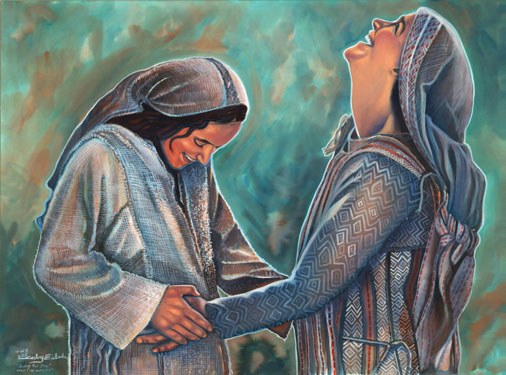 Enter into the picture, Mary’s older cousin, Elizabeth.
Enter into the picture, Mary’s older cousin, Elizabeth.
Another unexpected thing happens in this family---
Elizabeth, at an unknown age way past childbearing years, has found herself pregnant too. Though thinking for years that she was barren and thus, looked upon in society as second class beyond her already lower status state, a child comes to her womb too.
Her son will be named John and will be given the responsibility to prepare the way for the Christ.
So when Mary had the idea of setting out to see her cousin Elizabeth, it was an important meeting for them both. These two—together—might just have some insight into what this crazy God they worshiped was all about.
Then as soon as Mary greeted Elizabeth, Elizabeth’s child is recorded as “leaping in her womb.” It was a prophetic sign that even in spite of the confusion swirling around both of their lives something greater than both of them was occurring. God was very close.
And for the next three months, these two unlikely prophets and prophetic children they are carrying, come to see how their state of being can be considered a blessing.
Rev. Barbara Brown Taylor writes about what occurs with Mary’s state of mind as a result of being with Elizabeth: with her “the young girl doesn’t have to explain her situation to Elizabeth or ask her questions in search of answers, even to ask for acceptance.
When Mary sees her older cousin, Taylor imagines, she sees a ‘gorgeous’ woman, not gorgeous by ordinary standards, you understand, but so full of life that is hard to see beyond her joy.”
The unexpected thing that happens from the moment Mary walked into Elizabeth and Zachariah’s house is that Elizabeth became for Mary the mother figure or spiritual mentor that she needed to re-frame the story of all that was happening to her.
And so as the baby Jesus leaps in Mary’s womb, it is Elizabeth who speaks blessing over Mary’s life in a way that she could only have really heard from her: “Blessed are you among women, and blessed is the fruit of your womb.”
Elizabeth re-narrates this thing that has happened to her cousin in a way she could understand it to be the goodness of God coming to her. Elizabeth gives Mary language to understand this blessing so she can praise God for it!
And through Elizabeth’s loving care, Mary would begin to see that what was happening to her not as “that day that ruined my life” or “some unfortunate circumstances” but a blessing!
I love Elizabeth for this reason—and believe we all need more Elizabeth's in our life (no pun intended!)
But it’s important to say here that as Mary gained this new supportive friend, noting about the hardship of her situations really change (or Elizabeth’s for that matter).
A lot of hard stuff was next! Mary needed to tell Joseph some unwanted news. Soon she would have to endure the stares at the marketplace (everybody wondering, who is Mary’s baby daddy?). And Mary would still have to meet the sharp pains of childbirth in ancient Palestine without much help.
But she would not be alone. Elizabeth would be with her in spirit. God’s son would be growing in her belly.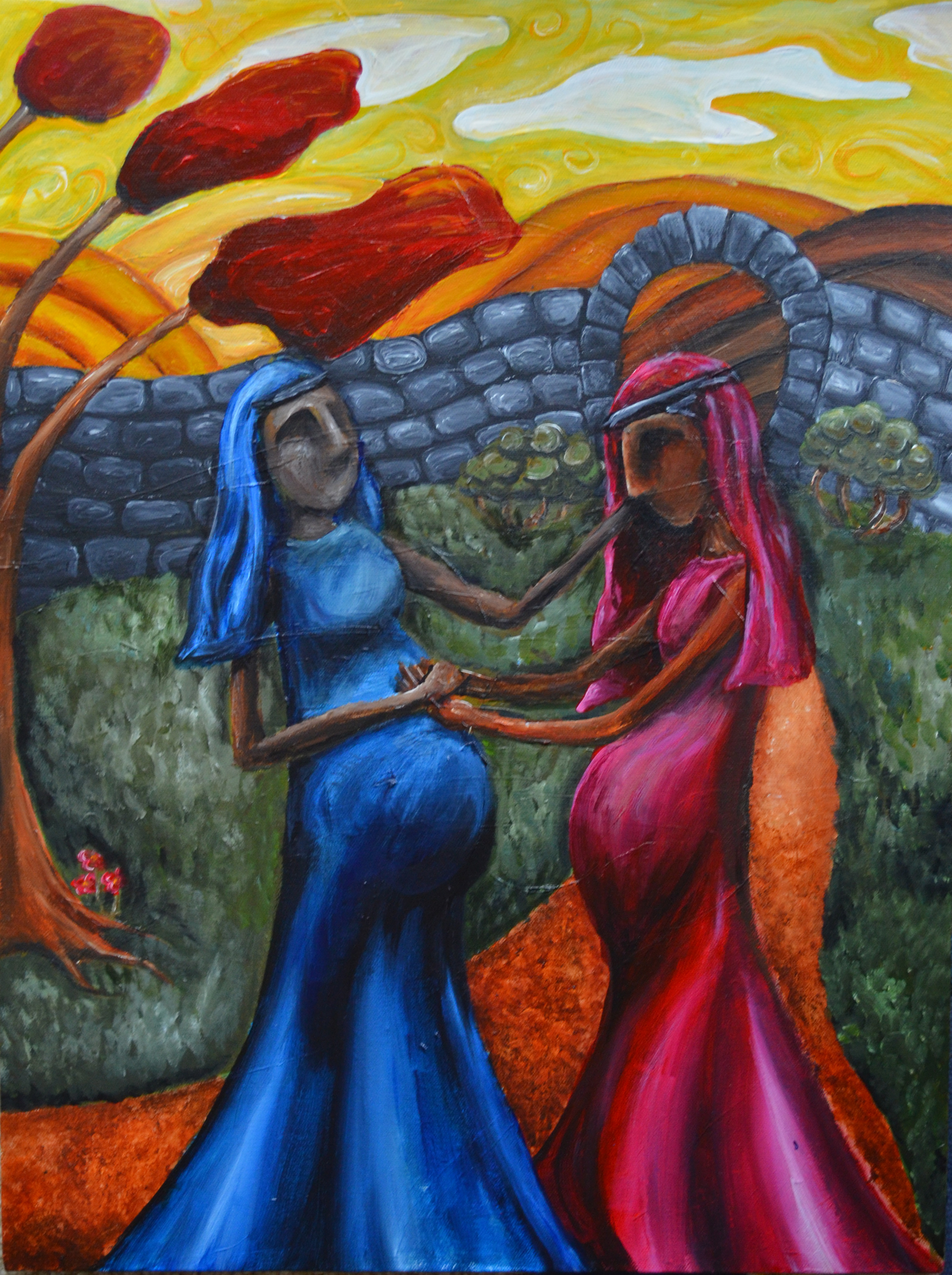
And even thought Mary may not have understood why God choose her, there was a lot to sing about.
That afternoon at Elizabeth’s house, Mary was the unlikely soloist in God’s choir (who knows if she could even carry a tune) but she sings: “My soul magnifies the Lord, and my spirit rejoices in God my Savior . . .. Surely, from now on all generations will call me blessed; for the Mighty One has done great things for me, and holy is his name.”
But, Mary could have been angry.
She could have been overtaken by fear.
She could have protested to God—this is not how the first Christmas should be! I don’t want this part in the play!
But she doesn’t.
She makes the choice to receive the unexpected. She welcomes God into her very being.
Maybe not in the way that history always tells her story—passive full of blind submission, but I believe with maturity that could have only came from sticking close to dear ones like Elizabeth and to her own spiritual instincts.
And as Mary sings about how God “has looked with favor on the lowliness of his servant” she is embodied this new direction of God’s song for all people!
For in God choosing her a peasant girl, God is saying loud a clear, the economic and social tables of this world will soon be turned upside down. A new world order is coming in the kingdom of God that Mary’s child will preach and proclaim. Everything will change!
The most unexpected blessing of all would be that the fruit of her womb, Jesus, would soon bless ALL people of the earth. You and I would not be sitting here today if Mary had not received God’s unexpected gift.
And isn’t it true? God’s unexpected gifts are always better than we could imagine!
So I ask you again, what are you expecting this Christmas?
Anon, a leader of the Islamic faith recorded this prayer about the coming of blessings:
I asked for wisdom...
And God gave me problems to solve.
I asked for prosperity...
And God gave me brains and the strength to work.
I asked for courage...
And God gave me danger to overcome.
I asked for love...
And God gave me troubled people to help.
I asked for favors...
And God gave me opportunities.
I received nothing I wanted.
I received everything I needed.
My Prayer has been answered.
I shared this prayer because I have seen it come true time and time again in my life.
How often have I set out on a life path thinking, I know exactly how the story is all going to end, only to land somewhere different? But ultimately is better if I’m walking in the ways of the Spirit?
Just think for a moment where in life you were on this day—December 21st or hereabouts last year?
What were you consumed with? What were you worried about? What were you spending most of your time on?
I think about my own life—last Christmas, sort of sad. I was thinking about how much I had to say but no place to say it. But now, I am having so much at The Federated Church.
If we take just a moment to gain some big picture perspective, what we’ll find is that God is doing unexpected things in our lives all the time. He’s making crooked paths straight. He’s leading us into new relationships. He’s opening doors where life’s cruelties have shut windows.
But the question for us is—how are we responding?
Are we blocking the movement of the Holy in our lives by being consumed in things that really don’t matter much in the end?
Are we blocking the moment of the Holy by refuses to see what are the best choices for our life’s routines?
Are we blocking the movement of the Holy by our own stubbornness to believe this unexpected story of redemption?
 Today, my friends let us take some encouragement from Mary. Let us follow in her footsteps and make the choice to believe. Knowing that as we do, an Elizabeth is on her way—whoever she may be—to inspire us for all that lies ahead.
Today, my friends let us take some encouragement from Mary. Let us follow in her footsteps and make the choice to believe. Knowing that as we do, an Elizabeth is on her way—whoever she may be—to inspire us for all that lies ahead.
Let us not let one more moment pass in this busy time of year where we don’t make room in our hearts for more peace, more hope, more joy and more love.
Why?
Because tis the season for Christ to be born and we need to get ready!
“Oh come my heart, Lord, Jesus, there is room my heart for you.”
AMEN
A Side of God We Really Don’t Want to See: Exodus 33:12-23
a sermon preached at The Federated Church, Weatherford, OK
In all human relationships-- with our spouses, our children, our friends—there are ebbs and flows, aren’t there?
There are days when we wonder why in the world we ever got married, had kids or keep in touch with so and so from high school . . .
But, there are days when we love beyond any words we can articulate for love.
Maybe it was your wedding day. . . .
Maybe it was the morning your child was born . . .
Maybe it was that girl’s weekend when you laughed and laughed till the sun came up. . . .
If you’ve ever been there . . . if you’ve ever experienced such bliss in your life where you feel safe enough to ask your loved one for anything—then you’ll understand what is come in our Old Testament reading for this morning.
For Moses and God have quite a good thing going on too. And Moses thought he reached such a level of devotion and trust in God that he feels he could ask for the ultimate expression of intimacy with the Divine: show me all of you!
And it was true: Moses and God were pretty close. But how did this happen?
Emotional bonds to dear ones, in my experience, often grow out of conflict.
Times when either you’ve made it through what feels like the unforgivable sin, only to realize the other person is a saint enough to forgive you. Or times when everything is swirling around you and it becomes a case of you and your partner against the world.
And for Moses and God, they’d experienced both!
If we go back one chapter earlier than we read in our text for this morning, what we’ll find is the great calf incident when the conflict came.This was the scene: for many months, Moses is up on Mount Sinai having holy time with the Lord—receiving the words of the law on the tablets, written by God very own hand. Can you imagine what an amazing experience that was?
But, in Moses’ absence the people gathered at the bottom of the mountain. They talk about how lost and left out they feel. They collect all the gold they can find  in the camp and create an object to worship, in the shape of a calf, creating their own object to worship like the other religious traditions of the time. They ignore the 10 commandments (which they already had), and each man and woman does what is best in their own sight.
in the camp and create an object to worship, in the shape of a calf, creating their own object to worship like the other religious traditions of the time. They ignore the 10 commandments (which they already had), and each man and woman does what is best in their own sight.
You can imagine how well this went over when God saw what was going on and Moses came down the mountain. . . .
The divide between Moses and the people was thick in the air.
In verse 9 of chapter 32, the Lord speaks of it saying, “I have seen these people,” the Lord said to Moses, “and they are a stiff-necked people. Now leave me alone so that my anger may burn against them and that I may destroy them.”
Since there is a chapter 33, we know that the Lord’s anger does not get the final word. The people are allowed to live. But like misbehaving teenagers, God grounded them (or in Biblical terms: God sent them a plague).
You can imagine how this changed the dynamic of the relationship between God and Moses—both in God’s disappointment with the people who Moses was seeking to lead and in “you and me” against the world sort of way. Moses was truly the one human being that God could trust.
In fact, earlier than we just heard read a few moments ago, we learn that God and Moses had taken their relationship a notch or two closer together.
Moses traveled a good distance outside the camp and pitches a tent where he could be with God alone. It was the ultimate man-cave if you will. A place where Moses could revel in his beautiful relationship with the Divine without the pesky less mature human-lings able to bother them . . .
In fact, verse 9 says of the splendor of this tent: “ As Moses went into the tent, the pillar of cloud would come down and stay at the entrance, while the Lord spoke with Moses.”
Moses and God were BFFs and everybody knew it.
All was be swell, right? But let’s recap. These were not two schoolboys. It was God Almighty, maker of heaven and earth!
But, in this cloud of closeness, Moses wants even more.
“We’re so close, God” Moses says. “And I’ve done everything you’ve ever asked of me.”
“Very true.” God replies.
“So, can you promise me a thing or two?”
“What do you want Moses?”
“I want you to go with me. You—just like we are in this tent.”
And as the conversation continues, God says no. You can’t have out there what we have in this special place of meeting. But you can have my presence and peace wherever you go.
(Isn’t that something that we ought to go back to more often? God says we are never alone and can always have the Lord’s presence and peace wherever we go).
But it wasn’t enough for Moses. He asks the Lord to “Show me your glory, I pray.”
But the Lord says, “You cannot see my face; for no one shall see me and live.”
And instead, the Lord offers up his backside. It’s not what Moses wants to see. It’s not what Moses asks for. And it is a reminder of the fact that God was not just another pal.
But, wow, as many commentators of this passage relate, what God offers is more than what most have seen of God throughout the scriptures: a visual encounter. And, Moses already had a visual encounter with the Holy at the burning bush a few years back!
Humorously, Professor John Holbert of Perkins School of Theology in Dallas asks this question about the passage: “Is it possible that God is mooning Moses?”
Maybe so.
I don’t know about you, but it’s not the sight of God I’m dreaming about seeing one day—a mooning.
And we get no indication as the story continues that Moses was thrilled about it either.
I think this is the case because we are a people who like certainty. We say to our co-workers and children, “Look me in the eyes when I am talking to you.” We say to a friend telling us a story, “Are you sure those facts are true?” We say to our partners: “Are you sure that you love me the most?”
In our closest relationships, we want to know that we know that we know!
And the same is true, I think in our relationship with the Divine. We want to know that we know that we are on good terms. We want to know that we are loved and cherished. The side of God we most want to see is what is found in the light of day where all is very CLEAR!
Rev. Barbara Brown Taylor writes in her newest book, Learning to Walk in the Dark about our fascination in modern Christianity with certainty and what can  be known in the light. In fact she gives it a label saying what you find in most churches in America is “full solar spirituality.”
be known in the light. In fact she gives it a label saying what you find in most churches in America is “full solar spirituality.”
She says you’ll know a full solar church when you find because: “Members strive to be positive in attitude, firm in conviction, helpful in relationship, and unwavering in faith.”
And while it works well for awhile—I mean who doesn’t like to go to one of the Disneyland of churches everyone is so happy and helpful? It can’t be sustained and remain authentic.
Things happen like: “you lose your job, your marriage falls apart, your child acts out in some attention-getting way, you pray hard for something that does not happen, you begin to doubt some of the things you have been taught about what the Bible says.”
And in cases like this, solar spirituality churches say just pray harder, just have more faith, or trust that everything happens for a reason!
Have you been told things like this from a church you attended? I know I have.
Taylor—most helpfully though, gives us another vocabulary for what our life in communion with God can be, though it is a side of God that we don’t often want to see.
She calls it “lunar spirituality”—or learning to walk with God in the dark.
And though most of us hear the word “dark” and think, oh, that must be bad. It’s not. Darkness can be a gift of clarity. Because if we think about it—even in the darkest night there’s always some light!
 When is the last time you took a walk outside of the city limits at night? Do you remember what you saw?
When is the last time you took a walk outside of the city limits at night? Do you remember what you saw?
I’m a city girl and don’t get out much into the country in the evenings. But the last time I visited my in-law at their farm in Georgia, I can remember being overcome with the light of the stars I had not seen in a very long time. It took my breath away in fact to stop and behold the glory of the night sky, of God’s creation—that I’m usually so in a hurry to get inside for that I miss.
Taylor affirms this when says, “The way most people talk about darkness, you would think that it came from a whole different deity, but no. To be a human is to live by sunlight and moonlight, with anxiety and delight, admitting limits and transcending them, failing down and rising up. To want a life with only half of these things is to want half a life, shutting the other half away where it will not interfere with one’s bright fantasies of the way things ought to be.”
It’s as if our vocabulary of God has got to change if we really want to know the Lord! For the God of the dark nights, the God of the backside view, the God of the mysterious, who can feel so close to us in one moment and distant in the next: is who God is.
And though it might not be the God want to see—as Moses experienced it, if we follow the path of God’s kingdom, it is what it is going to be.
St. Gregory of Nyssa said, “Those of us who wish to draw near God should not be surprised when our vision goes cloudy, for this is the sign that we are approaching the opaque splendor of God.”
And while the theology of “solar spirituality” or “God is the light” are part of our journey—it’s just NOT what we’ll experience all the time.
Like in our relationships with our spouses, our children, and friends, we aren’t going to be in total harmony 100% of our journeys together, even more so with our relationship with God. There are going to be times when we are in the dark. There will be nothing we can do about it, except to sit, to walk and to learn from God there.
We learn that God is altogether not like us.
We take comfort in the fact that God is not like us—and we can’t see all of God’s glory—because the problems of our lives, of our world need a much bigger solution than any human can even wrap their brains around!
And most of all, we are transformed by a side of God that is not like us.
As we wait in the dark we are transformed by God’s grace.
We are transformed by God’s compassion.
We are transformed by God’s sovereignty.
So that as we go through the days of our lives, we aren’t so surprised when the worse possible things happen to us and when the dark nights of the soul come.
We have the capacity to believe when God says; I will send you forth with my presence and my peace. And so we go forth into the world differently, even when the darkest nights surround us.
Though this may not sound like good news to you today, church, I am going to boldly tell you that it is.
It’s good news for all of us who have found ourselves in seasons of life that we really didn’t want and bouts of sadness that just won’t go away.
It’s good news for all of us who have ever doubted our faith or wondered if we were really a Christian.
It’s good news for all of us who like to sit out at night and gaze at the night sky feeling overwhelmed by how vast this universe really is!
Sure, there’s a side of God that none of us might ever want to see, just as Moses experienced long ago, but there’s a lovingly mystery waiting to meet us in those moments when we feel farthest away!
Thanks be to God.
AMEN
[P.S. If you'd like to read the introduction to Barbara Brown Taylor's book, check it out here. Great stuff!)
Recently, I've found myself in circles of people where the word "prayer" is not often used in conversation. No one seems to talk much about actual talking to God or Jesus. They just promise to hold one another "in the light."
I'm not quite sure what it means other than sending good energy toward a person in a difficult or challenging situation or a desire for good things to come. And while I don't think any of us would refuse such an intention in our direction (who doesn't want a good life?), whenever I hear it I wonder where is God? What is the person hoping between me, God and my understanding of the Divine?
I believe such an intention sets up a light vs. dark dichotomy Light is good. Dark is bad.
Good happens in the day. Bad happens in the dark.
We are living close to God when we are living in the light. We are far from the presence of God when we are in the dark.
All the buzz in theological circles I run in these days is Barbara Brown Taylor's book, Learning to Walk in the Dark.
(Here's my 5 second commercial: It's SO good I tell you. You. Must. Buy. It. Soon. It's a book that Christians will have in their collections for years to come because the theology is just SO good, SO fresh and SO timely for so many of us).
According to Taylor, we need not to be afraid of the dark. Dark is not the absence of God. Think of all of the Biblical characters who encountered God at nighttime or in a cloud of smoke. Remember Abraham, Jacob and Moses?
God is not ONLY found in the light. God speaks and dwells and abides in the dark too.
So as we seek to know the Divine, the dark nights of our soul are not just annoying times to somehow "get through" but opportunities to more fully Know.
Consider these words from Chapter 2:
The way most people talk about darkness, you would think that it came from a whole different deity, but no. To be human is to live by sunlight and moonlight, with anxiety and delight, admitting limits and transcending them, falling down and rising up. To want a life with only half of these things in it is to want half a life, shutting half way where it will not interfere with one's bright fantasies of the way things ought to be. . . . Those of us who wish to draw near to God should not be surprise when our vision goes cloudy, for this is the sign that we are approaching the splendor of God.
So, maybe there are more helpful ways to pray than holding each other in the light. Could we consider holding one another in the dark too?
And it's true isn't it? Our lives are lived as much in the light as it is in the dark. As much as we know what we know, we also don't know a lot.
So, then to pray for another to live in the light is to keep from one another the possibly some of the best (though painful) experiences of the Divine possible on earth.
What if the next time someone comes to us in crisis we promise to sit with them in the dark?
What if we helped one another embrace the dark by reminding each other not to be afraid, to keep walking baby step by baby step even if we have no idea where they going next?
What if we prayed for the moonlight to be tender and the howls of the darkness to be full of some comfort as our night journeys tarry on?
These are the kind of prayer utterings I want around my life.
Not Pollyanna promises of all will be well. Not pep rally prayers of "cheer up sweetheart." Not even more light send my direction. I don't want that.
But if the darkness is where I am or where I need to be then come be with me there. Remind me that God is not absent, even when I feel that way. Hold my hand, keep showing up in body and spirit and let's navigate through this darkness together. Let me tell you want the darkness is like. Be my darkness companion.
Don't let me not miss out on the smoke, the fog, the clouds of what I could behold . . God who shows up in darkness too.
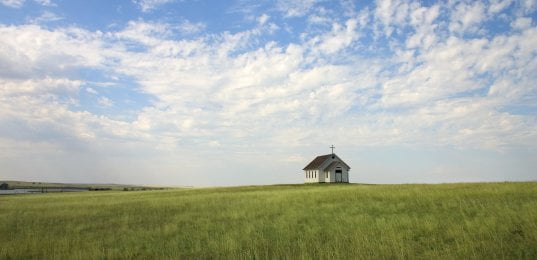 I was taught in seminary that the most virtuous thing you can do for your whole life is to serve the church with an undivided heart. "The church needs you!" my classmates and I were told over and over again.
I was taught in seminary that the most virtuous thing you can do for your whole life is to serve the church with an undivided heart. "The church needs you!" my classmates and I were told over and over again.
Sometimes our instructions included more details like this: “Take care of the church like nothing else matters. Live in the community where you serve, join every local board you can, and know your neighbors. Those who give their whole life to the church will not be disappointed."
And I tried. I really tried to become the best local church pastor I could be. I attended neighborhood meetings. I sat at the bed of the sick. I climbed into the pulpit week after week. And for a while it was my calling.
I wanted to fit into the one-size fits all church box forever. I wanted to come back to my 30-year Duke Divinity School reunion and tell stories about the pastoral life just like I'd heard out of my beloved professor, Dr. William Quick.
But after six years in full-time church ministry I found that I could not-- even as much as my heart really wanted to. My time was up.
Walking away from what I once felt was my dream job (as a solo pastor in the Baptist tradition) last Christmas became one of the hardest decisions I ever had to make.
I heard recently that when newcomers ask the church I formerly pastored why I left they say that "She become a writer." While I’m flattered with being identified as a writer (and I love writing), this is not quite it.
Furthermore, the change had nothing to do with the lack of joy in little congregation as they were great people. Nor was it all about my husband’s job in another state. Or even about the grant I received from the Louisville Institute to write a book, though these reasons seemed like legitimate ones on the surface.
No, I left local church ministry last year because I was finally ready to say yes to a calling. I was ready to be a nobody (if that is what folks thought of me) in order to be the somebody that I really am.
Right now, I am following that calling (though the "what do you do?" questions at parties now are harder to answer).
In the world from which I came both as a child of a pastor and also of a local church pastor making seminary-- to leave the church for something else felt to me like treason.
But in the past several years, I come to believe that being a whole person is much more important than a respectable career even if you have to feel like an outcast upon leaving. I took some cues from Barbara Brown Taylor here.
And for me to be a whole person, this is what I know:
I am not made for a job or type of job that lasts me my entire career.
I am not made to immerse myself into a particular local church community for a long time.
I am not made to just do one thing all the time or even just one thing at once.
I am not made for denominational life or ministry that values institution building over freedom of the Spirit.
Yet, with all of this said, I am made however for bolts of energy into new projects that need a leader.
I am made for community building with the global church.
I am made to multi-task my way through a variety of vocational pursuits that often on the surface seem like they have nothing to do with each other, but actually do!
I am made to speak the truth about systems that are broken.
And in all of this, I still feel ordained. I've not stopped being Rev. Hagan. I still feel like I’m in ministry.
I’m a writer sometimes.
I find myself in pastoral care conversation sometimes.
I’m a preacher sometimes.
I’m a strategist for creating community both in person and online sometimes.
I’m an administrator sometimes.
I do the laundry all the time. And I make dinner most of the time.
I'm thankful for the chance to do all of this "outside the church" but never too far from its larger mission.
And it fits. It really fits. The restless whispers of my heart have stopped yelling at me. I'm finally at home.
I feel settled even as pace of our current travels and activities make my family’s head spin when I inform them what I'm up to.
In this non-traditional life, I am happy. Truly I am.
I love supporting the communications department of Feed The Children. I love writing in a variety of different venues. I love having quality time for friends. I love traveling alongside my husband. I love preaching in settings (like next week in Hawaii!) that a local church schedule would normally not allow. I love that I have the freedom to find God both in and outside the church walls on Sunday morning-- depending on the week.
Lesson learned: when the whispers come, listen. I’m so glad I did. I hope I have the courage listen sooner next time. It’s ok to be different. Actually it is really wonderful even if some of my friends in the church don't understand.
Let me introduce you to a great story of what the ministerial life is all about from my pastor and writing friend MaryAnn. Check it out here:
[vimeo http://vimeo.com/35585025]
After watching it again this week, I was reminded again of one of my favorite Barbara Brown Taylor quotes from her book Leaving Church:
“. . . the call to serve God is first and last the call to be fully human . . . Like every believer I know, my search for real life has led me through at least three distinct seasons of faith, not once or twice but over and over again. Jesus called them finding life, losing life, and finding life again, with the paradoxical promise that finders will be losers while those who lose their lives for his sake will wind up finding them again.”
How are you being human this week?
A season of Sabbath is upon me and I'm gonna take a nap. Might even turn off my phone next week . . .
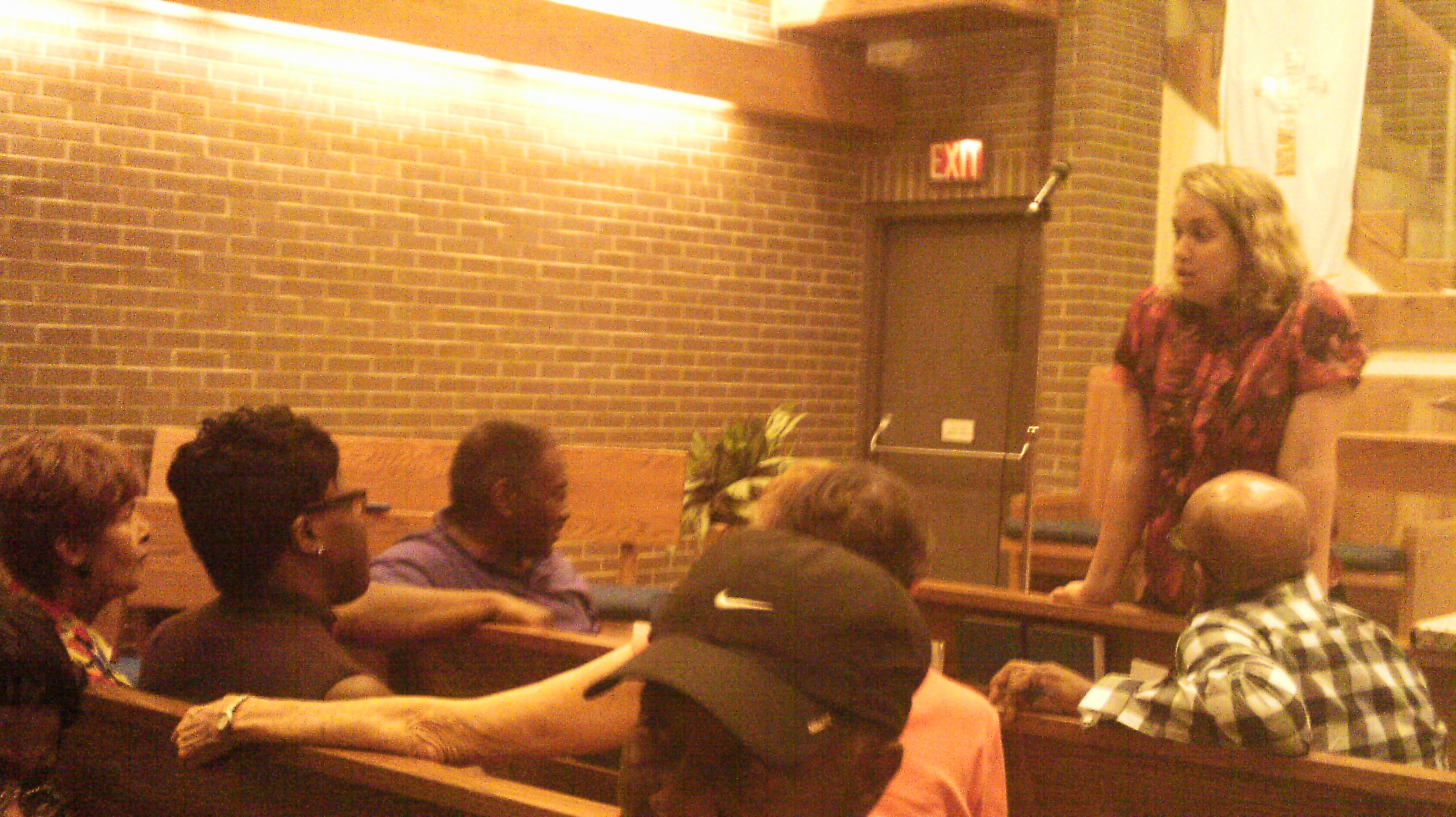 Last Wednesday night, Washington Plaza began a joint fall effort with our friends at Martin Luther King, Jr. Christian Church just down the street in Reston. We're doing Bible Study together for the next 12 weeks.
Last Wednesday night, Washington Plaza began a joint fall effort with our friends at Martin Luther King, Jr. Christian Church just down the street in Reston. We're doing Bible Study together for the next 12 weeks.
MLK Church and WPBC are no strangers to one another. We've been friends for a while now. I count Rev. Jean Robinson-Casey one of my dearest clergy colleagues. Over the course of the past two years, we've shared a special Diversity service together, Good Friday services, a Maundy Thursday service and one Sunday morning joint worship service where I was asked to preach for MLK's 30th anniversary (with a joint lunch together to follow).
But as is the case with all kinds of friendships, there comes a time when you have to take things to the next level. If you are going to be friends, you really have to be friends, not just in words but in actions. Rev. Casey and I both agreed that a joint Bible study on Wednesday nights this fall was just the right next step. Our fellowship and learning would be sweeter, we knew. Rev. Casey and I dreamed together one afternoon over lunch about what we might like to study and how our coming together could bless both of our congregations. We'd study, Barbara Brown Taylor's book, An Altar in the World. And, let the Spirit lead us into the rest.
Last Wednesday night, we had a great kick-off to this joint venture! The sweetness that always seems to be there when both churches gather shone through. It seems no profound to say it was fun, but it truly was! We laughed and shared stories with one another. It felt to me, as it always seems to feel when we gather that "This is how church should be!" MLK folks came over to WPBC's sanctuary and I led the discussion. Tonight, we'll go to MLK's building and Rev. Casey will lead us.
The sky's the limit to see how God continues to lead our friendship as we grow together in study this fall! I'm one happy pastor to be along for the ride.